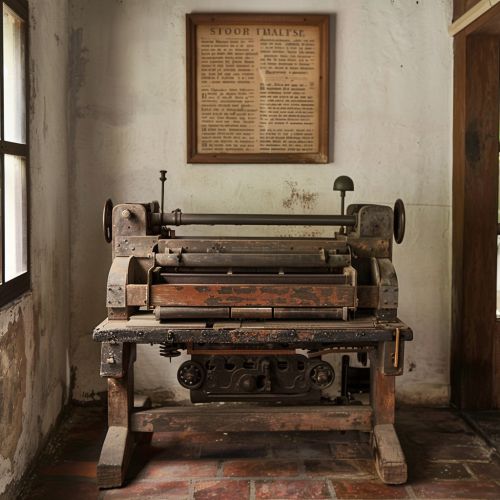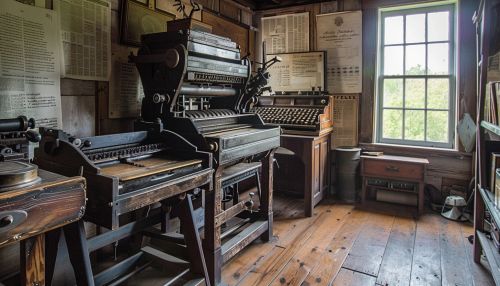Freedom of the press in the United States
Introduction
Freedom of the press in the United States is a fundamental right enshrined in the First Amendment to the United States Constitution. This right ensures that the press can operate independently and without undue interference from the government. The concept of press freedom is critical to the functioning of a democratic society, providing a check on government power and enabling the dissemination of information to the public.
Historical Background
The origins of press freedom in the United States can be traced back to the colonial period, where early American settlers brought with them the English tradition of a free press. However, it was not until the ratification of the First Amendment in 1791 that press freedom was explicitly protected. The First Amendment states: "Congress shall make no law... abridging the freedom of speech, or of the press."
Colonial Era
During the colonial era, newspapers and pamphlets were the primary means of disseminating information. Early American publications often faced censorship and legal challenges from colonial authorities. One notable case was the trial of John Peter Zenger in 1735, where Zenger was acquitted of libel charges for publishing criticisms of the colonial governor. This case set a precedent for the protection of press freedom and highlighted the importance of a free press in holding government accountable.
Post-Revolutionary War
Following the American Revolution, the newly formed United States grappled with defining the scope of press freedom. The Alien and Sedition Acts of 1798, which criminalized criticism of the federal government, sparked significant controversy and opposition. These acts were eventually repealed, reinforcing the principle that the press should be free from government suppression.


Legal Framework
The legal framework for press freedom in the United States is primarily based on the First Amendment. Over the years, the Supreme Court has played a crucial role in interpreting and defining the extent of press freedom through landmark cases.
First Amendment
The First Amendment provides the foundation for press freedom in the United States. It prohibits the government from making laws that abridge the freedom of the press. This protection extends to all forms of media, including newspapers, magazines, television, radio, and the internet.
Landmark Supreme Court Cases
Several Supreme Court cases have shaped the understanding of press freedom in the United States:
- **Near v. Minnesota (1931)**: This case established the principle that prior restraint, or government censorship before publication, is unconstitutional except in exceptional circumstances.
- **New York Times Co. v. United States (1971)**: Also known as the "Pentagon Papers" case, the Supreme Court ruled that the government could not prevent the publication of classified documents related to the Vietnam War, emphasizing the importance of a free press in a democratic society.
- **Branzburg v. Hayes (1972)**: The Court held that journalists do not have a First Amendment right to refuse to testify before a grand jury, balancing press freedom with the needs of the judicial system.
Modern Challenges
In the contemporary landscape, freedom of the press faces numerous challenges, including technological advancements, economic pressures, and political polarization.
Technological Advancements
The rise of the internet and digital media has transformed the landscape of journalism. While these advancements have democratized access to information, they have also introduced new challenges such as the spread of misinformation and the decline of traditional news outlets.
Economic Pressures
The economic viability of news organizations has been threatened by declining advertising revenues and changing consumer habits. Many traditional newspapers have faced closures or significant cutbacks, raising concerns about the sustainability of quality journalism.
Political Polarization
In recent years, political polarization has intensified attacks on the press. Accusations of "fake news" and hostile rhetoric towards journalists have undermined public trust in the media and posed threats to press freedom.
Role of Press Freedom in Democracy
Press freedom is essential for the functioning of a democratic society. It serves as a watchdog, holding government officials accountable and providing citizens with the information they need to make informed decisions. A free press fosters transparency, encourages public debate, and helps prevent the abuse of power.
International Comparisons
While the United States is often seen as a bastion of press freedom, it is important to compare its protections with those of other countries. Various international organizations, such as Reporters Without Borders, rank countries based on their level of press freedom. These comparisons can highlight areas where the United States excels and where it may fall short.
Conclusion
Freedom of the press in the United States is a cornerstone of democracy, protected by the First Amendment and upheld by landmark Supreme Court decisions. Despite modern challenges, the press continues to play a vital role in informing the public and holding power to account. Ensuring the continued protection and support of press freedom is essential for the health of the democratic process.
